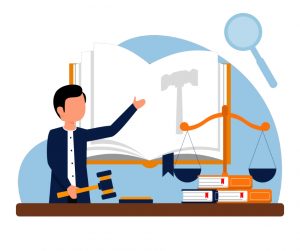Importance of Technology In Law: Technology is the innovation of ideas and processes usually embedded in the performance of specific tasks, thereby facilitating the process and enhancing accuracy in results. Technologies are the works and inventions of science. The center purpose of technology is to prevent problem, solve an existing problem and modify an already existing solution in an improved manner. The relevance of technology is immeasurable. It is through scientific innovations that technologies are produced, hence the reference of technology as a product or result of science.
Technology has permeated through all sectors of the economy and livelihood, and the field of law is not excluded. To this extent, technology is becoming unavoidable and in fact, indispensable, for it would be almost impossible for the society to return to the primitive age.
The society would rather develop, modify and advance the existing technologies in order to solve more problems easier and faster. The emergence of technology is not without negative effects, however, its contribution to livelihood immeasurably outweighs.
Recommended: Most technologically advanced countries in the world
Technology and Innovation in the Legal Sector
Technology has permeated the field of law also. The reference of technology in the field of law is particularly in respect of administration of justice and law practice. Just like technology aids in facilitating easy performance and processes, it has the same effect to the same extent in the field of law. This could be seen in the use of information and communication technology means and devices and other technological gadgets in law field. For instance, today, the court system employs the frontloading system for filing of processes.

The frontloading system requires parties from all sides to type, print, submit and exchange their processes. The typing and printing is made possible and easier by the use of computers and printers which are technological gadgets. Prior to the emergence of computers and printers, there was a more tasking equipment known as typewriter; it takes more time to use, more difficult to operate and less accurate in its result.
This is where technology has played its role of modification of solution which particularly has contributed positively to the field of law. There are several other instances of similar contributions of technology to the field of law, and these contributions to be highlighted forms the evidence and basis of the relevance of technology in law.
Also see: Pictures of the rarest animal in the world
Roles, Benefits and Importance of Technology in Law
Here are the importance of technology in law:
1. Promotion of Fair Hearing: The use of modern computer and printer makes the preparation of processes a lot easier and faster. Y being easier and faster, ample time is provided for parties to prepare and file their processes, and in addition to the frontloading system, the rate at which parties ambush the other is reduced. Also with the invention of information technologies and Medias, counsel from all sides can easily relay information to the other counsel and to the court registrars where mobility does not permit.

For instance, notice for extension of time or notice of proposed adjournment may be relayed through electronic mail. This promotes fair hearing, for it is a requirement of law that notices must be given in prescribed circumstances.
Recommended: Advantages and Disadvantages of Friction
2. Easier and Faster Dispensation of Trials: Gone are the days when lawyers do their cases orally while the court records every bit of their oral contentions. This development is still traceable to the emergence and use of typewriters and computers for typing.

For instance, nowadays, motions are rather documented and filed as opposed to having the court take record of motions being presented orally. Judges also make use of computers to prepare rulings and judgment as opposed to the use of typewriter which is more strenuous to use, consumes more time and has poor accuracy output.
The introduction of E-Proceeding is also a development necessitated and made possible by technology. The system is such that saves time. E-proceeding took its full effect and benefit during the spike era of covid-19.
The judicial system did not hesitate to adopt the e-proceeding. This is achieved by adopting media technologies that allows for videoconferencing such as Zoom, Google Meet, Skype, and so on. This makes it possible for proceedings to be has at one’s comfort, distance not being a barrier. This benefit also extends to witnesses traveling to and fro far places to testify in court.
Also see: How to properly introduce yourself in a debate
3. Easy Assessment of Reports: Through technology, court reports; rulings and judgments can be obtained via online means. First, Law Reports can be ordered via online at the buyer’s own comfort.

In some jurisdictions (that is, in some countries) reports can now be assessed online n a readable format. This benefits the lawyers in particular and of course other members of the society that may be interested in assessing judicial reports. This also contributes to the development of the law.
4. Establishment of Evidence: The emergence of technology has made it a lot easier to establish evidence in furtherance of a case. This necessitates the principle of electronic evidence.
Evidence can now be generated by the use of technologies and such evidence is admissible in court. Electronically generated evidence are always cogent and compelling. It actually helps the court in arriving at manifest justice.
Also see: Countries with the best education system in the world 2022
5. Decongestion of the Court and Offices: When technological medias are adopted for filing of processes and where e-proceeding is adopted, it guarantees speedy trials and easier dispensation of justice. By this, the courts and offices are decongested.
6. Communication Between Lawyers, Clients and Registrars: Technology makes it easier for information to be transmitted and received between lawyers, clients and court registrars.

7. Documentation: As opposed to the risk of mere physical documentation, technologies can be employed to document and back up records such as court judgment, case files, affidavits, wills and testamentary dispositions, agreements, and so on.
Recommended: How to become a successful business entrepreneur
8. Finance and Accounting: The legal industry is a revenue generating one. In addition or dispensation with manual records, software can be used to make and track records of income revenue, profits, losses and all financial transactions being carried out. This technology can be adopted by the court and law firms.
9. Reminder Software: Softwares can be used by law firms to set reminders as to when cases being handled by them are coming up I court. This saves a lot of havoc from occurring.
10. Increased transparency: There used to be a distrust people hold against lawyers because of how they complicate seemingly trivial matters for their clients. This has made clients doubt every lawyer they meet.
However, this situation can be curtailed with the use of legal practice management tech solutions. The solution involves creating a marketplace where clients can connect to the best legal professionals and create real-time connections while getting acquainted with basic legal terms and requirements. This would bring about transparency in the legal profession. The introduction of client reviews to the legal profession will also restore trust in lawyers
11. Collaboration among lawyers: Lawyers can now work together on cases alternatively and simultaneously with ease with just one document. Tools like Google Docs, Microsoft Teams, Slack, etc. help lawyers in different locations work remotely on cases, saving the cost of transportation and paper. Hence, lawyers can now render their services to more clients, irrespective of their geographical location.

Also see: Advantages and Disadvantages of Medical Technology
Drawbacks to The Use Of Technology in Law
The use of technology in law is not without drawback, just like it is generally applicable to other fields which technology has permeated. The possible drawbacks include;

1. Risk of Corruption Cyber Insecurity: Documentation by the use of technology stands the risk of hacking and corruption of files. Where the documentation is through online means, it stands the risk of cyber insecurity.
2. Cost: The cost of acquisition and maintenance of technological gadgets and data is not always affordable.
3. Requirement of Skilled Personnel: Another possible drawback is that the use of technology requires skilled personnel.
Recommended: Difference Between Reward and Incentive (With Examples)
Conclusion
What technology does basically is to reduce the input of physical man power. It however requires the input of human brain and intelligence. The relevance of technology in the field of law cannot be overemphasized for it has contributed immensely to the rapid development of the law.

Edeh Samuel Chukwuemeka, ACMC, is a lawyer and a certified mediator/conciliator in Nigeria. He is also a developer with knowledge in various programming languages. Samuel is determined to leverage his skills in technology, SEO, and legal practice to revolutionize the legal profession worldwide by creating web and mobile applications that simplify legal research. Sam is also passionate about educating and providing valuable information to people.